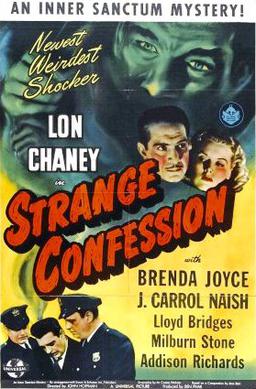Strange Confession
Strange Confession is a 1945 American film directed by John Hoffman and starring Lon Chaney Jr., Brenda Joyce, and J. Carrol Naish. The movie is part of the Inner Sanctum Mystery series, which were produced by Universal Pictures between 1943 and 1945. Strange Confession is considered one of the more compelling entries in the series, blending elements of horror, drama, and thriller genres. The film's narrative revolves around Jeff Carter, a chemist played by Chaney, who makes a horrifying discovery about an influenza drug he developed, leading to tragic consequences.
Plot[edit | edit source]
Jeff Carter, an idealistic chemist, is working on a revolutionary influenza drug. Despite his dedication, he is exploited by his unscrupulous employer, Roger Graham (played by Naish), who is more interested in profits than safety. When Carter goes on a research trip to South America to perfect the drug, Graham decides to market the unfinished product. The consequences are dire, leading to the death of Carter's own son. Upon his return, Carter learns of the tragedy and the deceit, leading to a dramatic confrontation and a confession that reveals the depths of his despair and desire for revenge.
Cast[edit | edit source]
- Lon Chaney Jr. as Jeff Carter
- Brenda Joyce as Mary Carter
- J. Carrol Naish as Roger Graham
- Lloyd Bridges as Dave Curtis
- Milburn Stone as Stevens
Production[edit | edit source]
Strange Confession is notable for its departure from the typical horror genre, incorporating a strong moral and ethical dilemma at its core. The film was directed by John Hoffman, who managed to create a tense atmosphere, emphasizing the emotional and psychological turmoil of the protagonist. The performance of Lon Chaney Jr. is particularly lauded for its depth and intensity, showcasing his versatility beyond the monster roles for which he was famously known.
Reception[edit | edit source]
Upon its release, Strange Confession received mixed reviews. Critics praised Chaney's performance and the film's exploration of themes such as corporate greed, ethical responsibility in scientific research, and the consequences of ambition. However, some viewed the film as melodramatic, with its moral message overshadowing the narrative. Despite this, Strange Confession has gained a cult following over the years, appreciated for its unique blend of genres and its commentary on issues that remain relevant.
Legacy[edit | edit source]
The film's exploration of the ethical implications of scientific research and the consequences of corporate greed has kept it relevant to contemporary audiences. Strange Confession is often discussed in the context of its critique of pharmaceutical companies and the exploitation of scientific discoveries for profit, themes that resonate in today's society.
Search WikiMD
Ad.Tired of being Overweight? Try W8MD's NYC physician weight loss.
Semaglutide (Ozempic / Wegovy and Tirzepatide (Mounjaro / Zepbound) available. Call 718 946 5500.
Advertise on WikiMD
|
WikiMD's Wellness Encyclopedia |
| Let Food Be Thy Medicine Medicine Thy Food - Hippocrates |
Translate this page: - East Asian
中文,
日本,
한국어,
South Asian
हिन्दी,
தமிழ்,
తెలుగు,
Urdu,
ಕನ್ನಡ,
Southeast Asian
Indonesian,
Vietnamese,
Thai,
မြန်မာဘာသာ,
বাংলা
European
español,
Deutsch,
français,
Greek,
português do Brasil,
polski,
română,
русский,
Nederlands,
norsk,
svenska,
suomi,
Italian
Middle Eastern & African
عربى,
Turkish,
Persian,
Hebrew,
Afrikaans,
isiZulu,
Kiswahili,
Other
Bulgarian,
Hungarian,
Czech,
Swedish,
മലയാളം,
मराठी,
ਪੰਜਾਬੀ,
ગુજરાતી,
Portuguese,
Ukrainian
Medical Disclaimer: WikiMD is not a substitute for professional medical advice. The information on WikiMD is provided as an information resource only, may be incorrect, outdated or misleading, and is not to be used or relied on for any diagnostic or treatment purposes. Please consult your health care provider before making any healthcare decisions or for guidance about a specific medical condition. WikiMD expressly disclaims responsibility, and shall have no liability, for any damages, loss, injury, or liability whatsoever suffered as a result of your reliance on the information contained in this site. By visiting this site you agree to the foregoing terms and conditions, which may from time to time be changed or supplemented by WikiMD. If you do not agree to the foregoing terms and conditions, you should not enter or use this site. See full disclaimer.
Credits:Most images are courtesy of Wikimedia commons, and templates, categories Wikipedia, licensed under CC BY SA or similar.
Contributors: Prab R. Tumpati, MD

